Lets vacuum seal a bunch of stuff!
I've had such great luck with vacuum sealing lettuce and salad stuff, I decided to just try vacuum sealing a bunch more stuff!
I'd like to eat more vegetables, but it's kind of a pain to prepare and cook vegetables for one. I much prefer pre-cooking, vacuum sealing, and freezing meat because meat keeps much better. I don't mind expending the effort to make homemade food, just not necessarily at the time that I'm hungry!
The vacuum sealing salad veggies with the lettuce worked pretty well, but this time I increased the amount per-serving and put them in a separate jar, since they don't keep as long as lettuce. This time I prepared radishes, green peppers, cucumber, yellow onion, carrot, crimini mushrooms, celery, and broccoli (blanched) for salad:
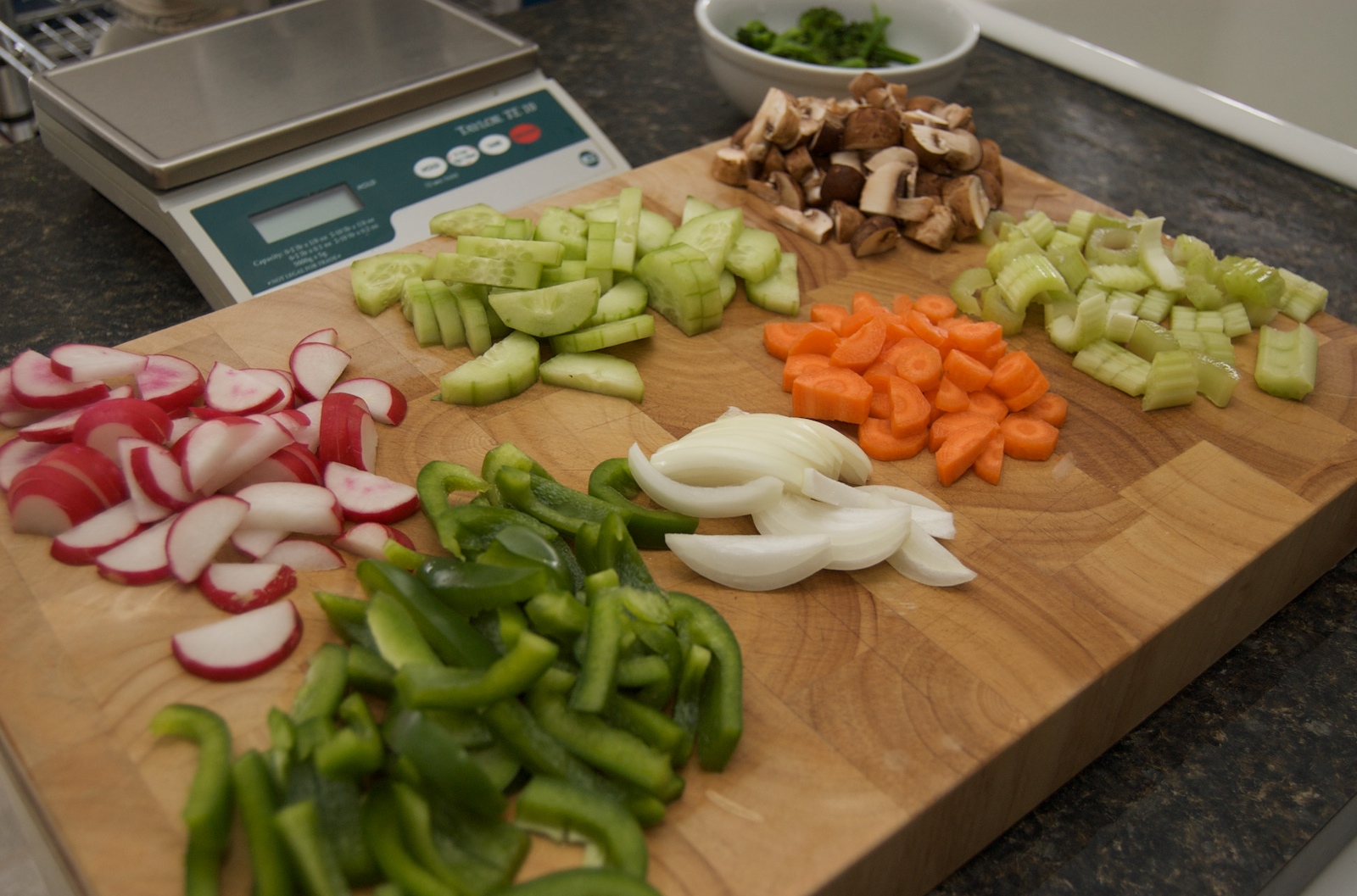 I prepared some more romaine lettuce; this time I tried vacuum sealing in bags instead of jars. I had to reduce the vacuum to 15 seconds (0.08 MPa) and it seemed to avoid crushing it too much.
I prepared some more romaine lettuce; this time I tried vacuum sealing in bags instead of jars. I had to reduce the vacuum to 15 seconds (0.08 MPa) and it seemed to avoid crushing it too much.
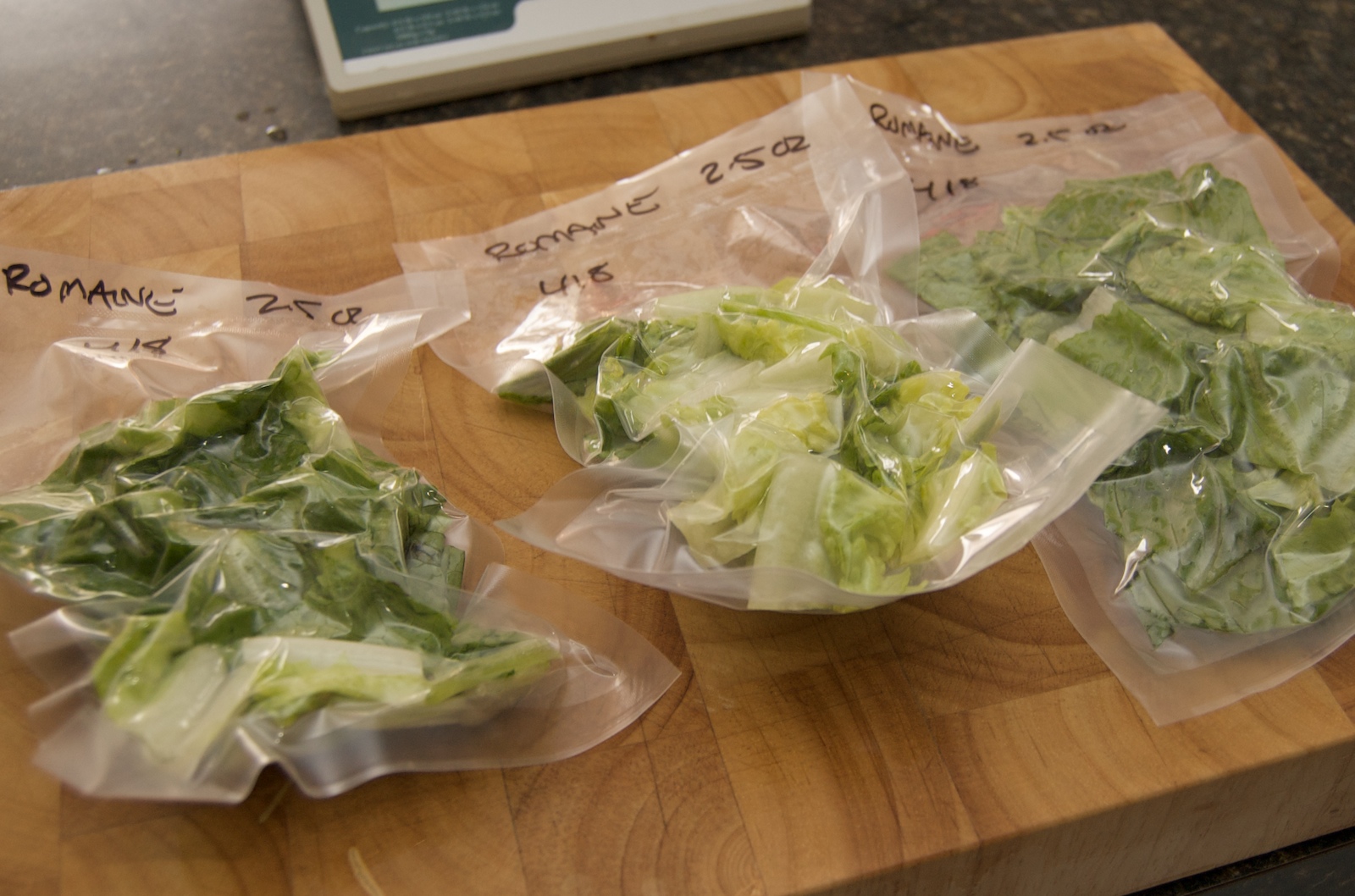 Update:4 days later, I've found that the romaine in bags does not last as long a the romaine in jars. I think it's because I had to lower the vacuum to prevent making the lettuce as flat as a sheet of paper, and it still got beat up pretty badly. In the jar you can get quite a bit of vacuum and the lettuce stays its normal shape. So jar lettuce is definitely preferable to bags, and not just because you can reuse the jars.
Update:4 days later, I've found that the romaine in bags does not last as long a the romaine in jars. I think it's because I had to lower the vacuum to prevent making the lettuce as flat as a sheet of paper, and it still got beat up pretty badly. In the jar you can get quite a bit of vacuum and the lettuce stays its normal shape. So jar lettuce is definitely preferable to bags, and not just because you can reuse the jars.
I also prepared a few more servings of baby spinach in vacuum sealed pint jars:
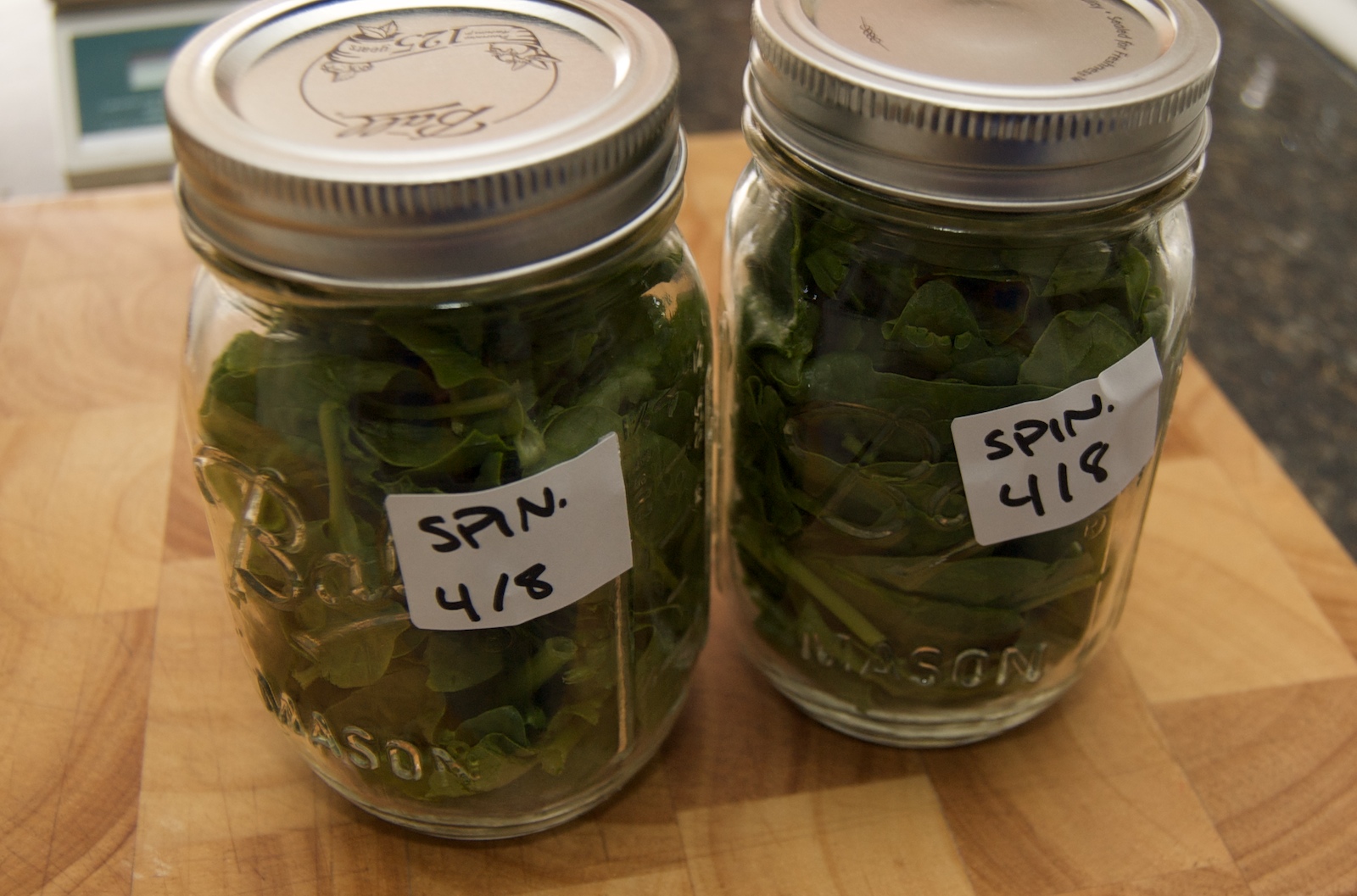 Because I'm a vacuuming maniac, I also vacuum sealed the remaining onion, radishes, and some broccoli. The broccoli in the store was getting a little old and would begin to brown at the edges soon so I washed, cut, and vacuum sealed that too.
Because I'm a vacuuming maniac, I also vacuum sealed the remaining onion, radishes, and some broccoli. The broccoli in the store was getting a little old and would begin to brown at the edges soon so I washed, cut, and vacuum sealed that too.
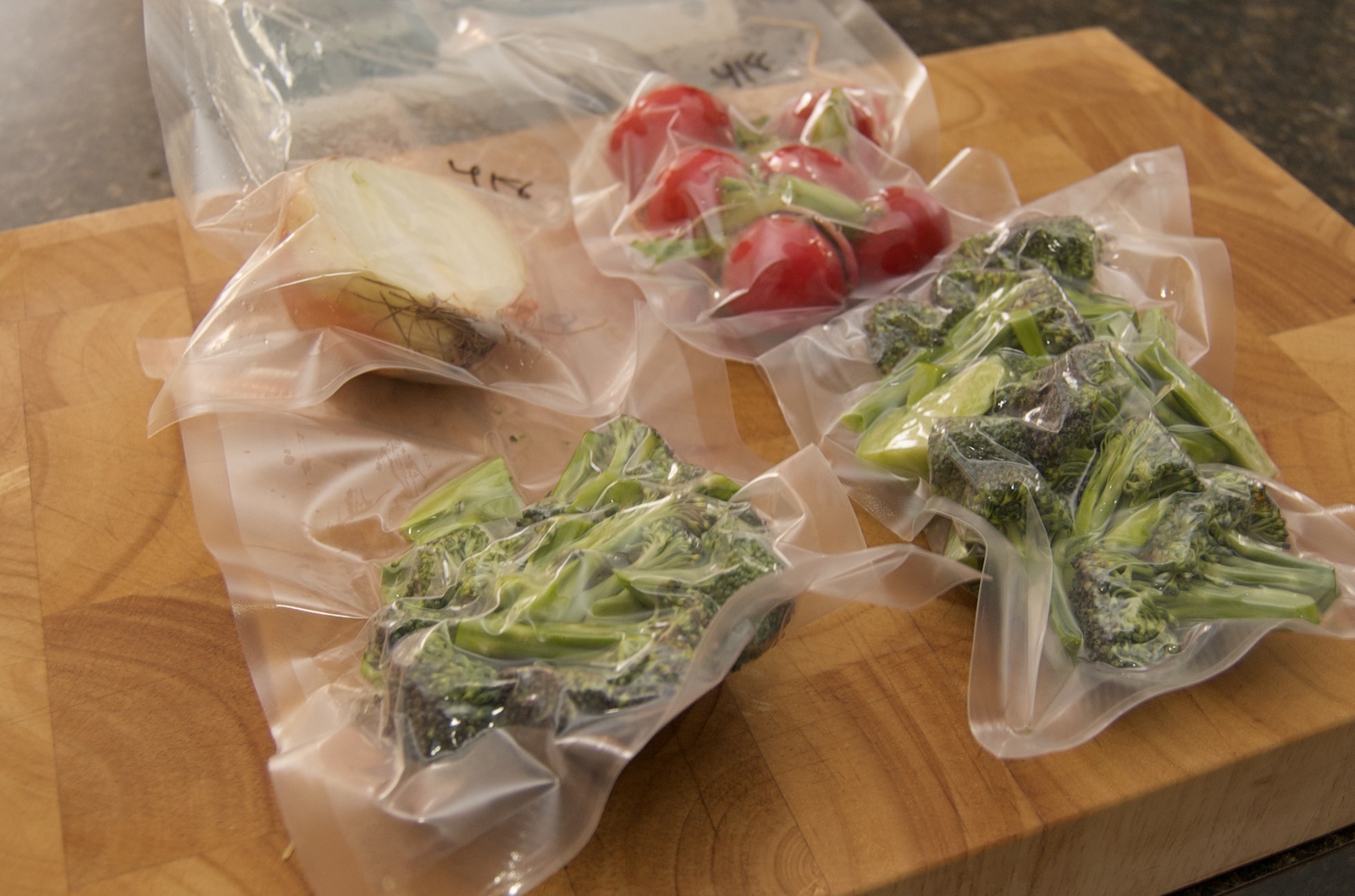 Update:So I learned an important thing: don't vacuum seal uncooked broccoli! It doesn't spoil, but wow, does it smell bad! Apparently when you store broccoli in a low-oxygen environment, methanethiol and other chemicals are produced and can't escape. There's scholarly research into this phenomenon. This doesn't seem to happening with the blanched broccoli that I've been putting in my salads, fortunately.
Update:So I learned an important thing: don't vacuum seal uncooked broccoli! It doesn't spoil, but wow, does it smell bad! Apparently when you store broccoli in a low-oxygen environment, methanethiol and other chemicals are produced and can't escape. There's scholarly research into this phenomenon. This doesn't seem to happening with the blanched broccoli that I've been putting in my salads, fortunately.
It's kind of a lot of bags, but I have a chamber vacuum sealer and my bags are thinner and significantly less expensive than FoodSaver style bags - mine are less than $ 0.04 each. That's less than half the price of store-brand zip-lock bags on sale! And it seems to significantly cut my food loss through spoilage, so I think it's probably a net win, even though I use more plastic.
Finally I made several servings of mixed salad veggies, both in canning jars and in vacuum bags. I'm interested to see if there's a quality difference between the jars and bags. I had intended to use 4 oz. jelly canning jars , but I was a little out of control on the veggies and apparently need to use 8 oz. canning jars, instead. I used 16 oz./pint jars since that was all that I had.
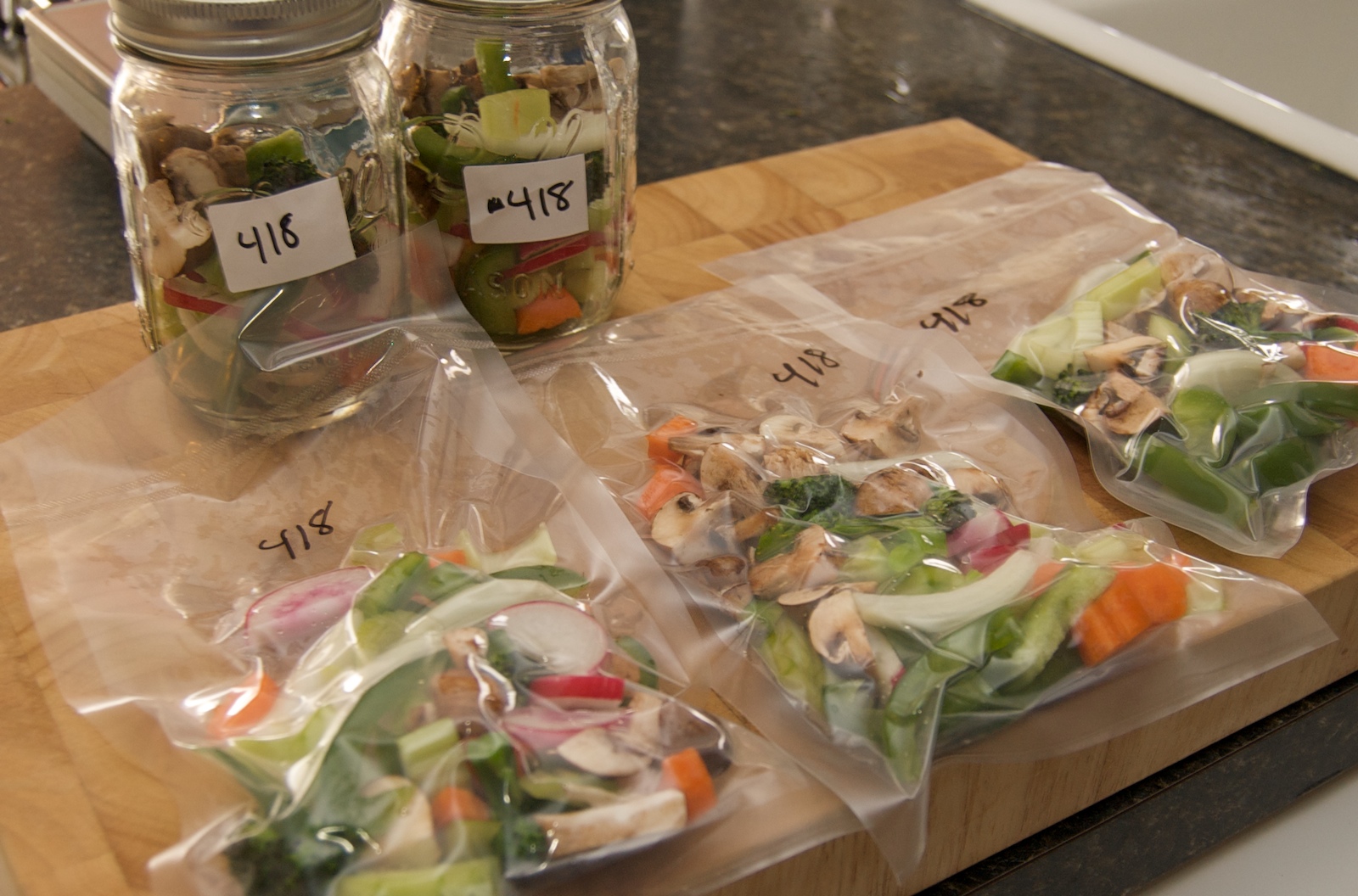 This was a fairly time-consuming process - nearly an hour - but I figure I get all that time back when I want a salad and I can just dump it on a plate!
This was a fairly time-consuming process - nearly an hour - but I figure I get all that time back when I want a salad and I can just dump it on a plate!
The followup posting shows salads made with the vacuum sealed vegetables after two and four days.
Update:I've also had great success with vacuum sealing: Green peppers Jalapeño peppers Avocado
Vacuum sealing radishes for long periods of time (weeks) appears to not work as well as you'd think for a relatively sturdy vegetable. The bag appears to inflate somewhat, the color leaches out, and they get very wet. Something is going on chemically but I don't know what yet.
Update 4/21/2014: I was reading Ideas in Foodand it pointed out that there is a danger of botulism in vacuum sealed food, because botulinum toxin thrives in an air-free environment. I haven't killed myself yet, but botulism is very serious stuff, so it probably is a good idea to limit your refrigerated vacuum sealed vegetables to a few days to be safe.